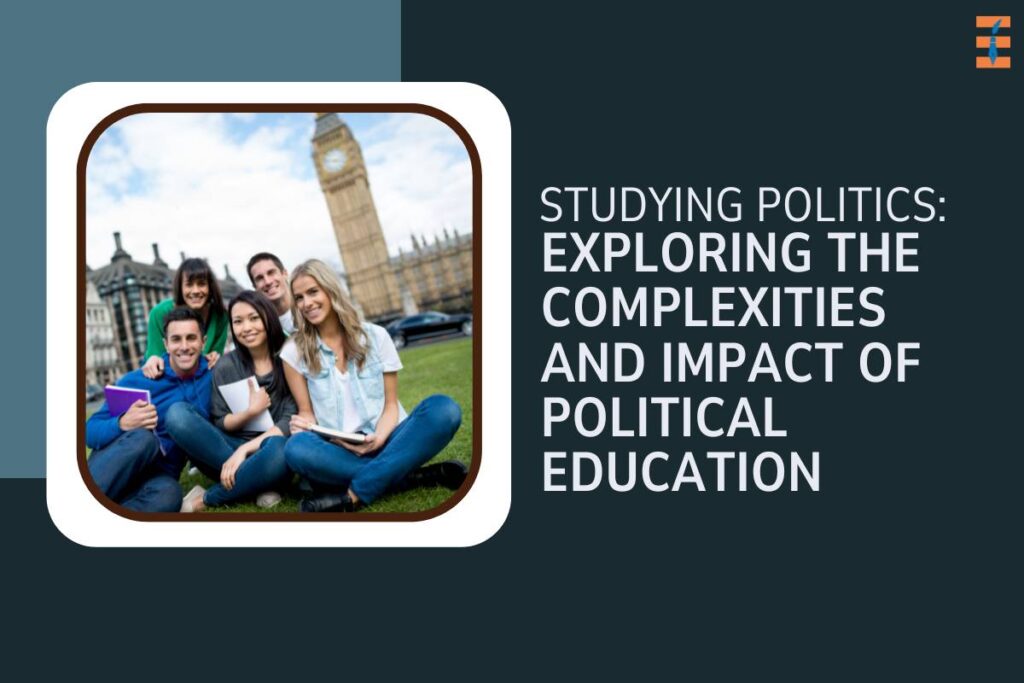Studying politics is an intellectual journey that transcends mere academic pursuits; it is an exploration of power dynamics, governance structures, societal ideologies, and global interactions that shape our world. From ancient philosophers pondering the ideal state to modern-day policymakers navigating complex international relations, the study of politics encompasses a vast and dynamic field of inquiry. In this article, we delve deep into the multifaceted realm of studying politics, examining its significance, challenges, methodologies, and real-world impact.
Understanding the Significance of Studying Politics
At its core, studying politics involves the analysis of how power is distributed, exercised, and contested within societies. Whether examining the intricacies of democratic processes, authoritarian regimes, or the influence of interest groups, political scholars strive to unravel the complexities of governance and decision-making. This exploration extends beyond national borders, encompassing global governance structures, international diplomacy, and geopolitical strategies that shape interactions between states.
The significance of studying politics becomes apparent in its direct impact on public policies, social movements, and the overall functioning of societies. Through rigorous research and analysis, political scholars contribute valuable insights into pressing issues such as inequality, human rights, environmental policies, and conflict resolution. By understanding the historical, cultural, and economic factors that influence political systems, individuals equipped with political education can engage meaningfully in civic participation, advocacy, and policymaking processes.
Navigating the Complexities of Political Education

The study of politics is characterized by its multidisciplinary nature, drawing from fields such as history, economics, sociology, law, and international relations. This interdisciplinary approach enables a comprehensive understanding of political phenomena, acknowledging the interconnectedness of various societal domains. However, this breadth of study also presents challenges, as scholars must navigate diverse theoretical frameworks, methodologies, and ideological perspectives.
One of the fundamental tasks in studying politics is the analysis of political theories and ideologies that underpin different systems of governance. From classical theories of democracy and liberalism to Marxist critiques of capitalism and postcolonial perspectives on power dynamics, students of politics engage with diverse intellectual traditions. This engagement fosters critical thinking, analytical skills, and the ability to evaluate political phenomena through multiple lenses, transcending simplistic narratives or ideological biases.
Moreover, studying politics involves empirical research methods such as surveys, interviews, case studies, and statistical analysis. These methodological tools enable scholars to gather data, test hypotheses, and draw evidence-based conclusions about political phenomena. However, navigating ethical considerations, accessing reliable data sources, and interpreting complex datasets are inherent challenges in empirical political research, highlighting the importance of rigorous training and methodological awareness.
The Evolution of Political Studies: From Classical Debates to Contemporary Challenges
The history of studying politics is marked by intellectual debates, paradigm shifts, and ongoing inquiries into evolving global challenges. Classical political thought, epitomized by philosophers like Plato, Aristotle, Machiavelli, and Rousseau, laid the groundwork for conceptualizing concepts such as justice, power, legitimacy, and the role of the state. These foundational ideas continue to inform contemporary political discourse and scholarly inquiries.
The emergence of modern political science as a distinct academic discipline in the late 19th and early 20th centuries witnessed the development of systematic approaches to studying politics. Scholars like Max Weber, Karl Marx, and John Stuart Mill contributed seminal works on bureaucracy, capitalism, democracy, and individual liberties, shaping diverse schools of thought within political studies. Theoretical frameworks such as realism, liberalism, Marxism, feminism, and postcolonialism offer lenses through which scholars analyze state behavior, international relations, and societal dynamics.
Contemporary challenges such as globalization, climate change, technological advancements, and transnational threats have further expanded the scope of political studies. The rise of digital politics, cybersecurity concerns, populism, identity politics, and global governance debates present complex phenomena that require nuanced analyses and interdisciplinary perspectives. Political scholars engage with these challenges through collaborative research, policy recommendations, and public engagement initiatives, demonstrating the relevance and dynamism of political education in the 21st century.
Impacting Societies Through Political Engagement and Advocacy

Beyond academic inquiry, studying politics empowers individuals and communities to actively engage in shaping political processes, advocating for social justice, and promoting democratic values. Political education fosters informed citizenship, critical awareness of media and propaganda, and the ability to participate meaningfully in electoral processes and policy debates. By understanding political systems, institutions, and decision-making mechanisms, individuals can navigate complex political landscapes and contribute to positive societal change.
Political engagement takes various forms, from grassroots activism and community organizing to policy analysis, diplomatic negotiations, and international advocacy campaigns. Civil society organizations think tanks and academic institutions play crucial roles in bridging academic research with practical policy recommendations and public discourse. Whether addressing issues of human rights violations, environmental degradation, economic inequalities, or democratic governance deficits, political actors leverage their knowledge and skills to influence decision-makers and mobilize public support.
Moreover, studying politics fosters diplomatic and negotiation skills essential for resolving conflicts, mediating disputes, and fostering international cooperation. Diplomats, policymakers, and peacebuilders draw on political insights, cultural sensitivity, and strategic analysis to navigate complex geopolitical challenges and promote peaceful resolutions. The intersection of politics with fields such as law, economics, and sociology creates opportunities for interdisciplinary collaboration aimed at addressing multifaceted global challenges.
Challenges and Opportunities in Contemporary Political Education
While studying politics offers valuable insights and skills, it also faces inherent challenges and debates within academic and public spheres. The politicization of knowledge, ideological biases in research, and echo chambers in digital media pose challenges to objective analysis and informed decision-making. Scholars grapple with ethical dilemmas in research, including issues of privacy, consent, and the impact of research findings on vulnerable communities.
Moreover, the dynamics of power, representation, and inclusion within academic institutions and political spaces require ongoing reflection and efforts to promote diversity, equity, and inclusion. Addressing systemic biases, promoting diverse perspectives in curricula, and fostering inclusive dialogue are essential aspects of enhancing the quality and relevance of political education in a rapidly changing world.
Technological advancements also influence political studies, shaping research methodologies, information dissemination, and political activism. The digital age offers opportunities for data-driven research, virtual collaboration, and global networking among scholars and activists. However, it also raises concerns about misinformation, digital divides, and the ethical use of emerging technologies in political contexts, highlighting the need for ethical guidelines and digital literacy in political education.
Future Directions in Political Education and Research

As we navigate complex global challenges such as climate change, pandemics, migration, and geopolitical tensions, the role of political education and research becomes increasingly vital. Future directions in political studies emphasize interdisciplinary collaborations, transnational perspectives, and ethical considerations in addressing pressing societal issues. Scholars explore innovative methodologies such as computational modeling, big data analytics, and participatory action research to gain deeper insights into complex political phenomena and inform evidence-based policies.
Moreover, fostering global citizenship education, promoting dialogue across diverse perspectives, and cultivating empathy and ethical leadership skills are essential aspects of nurturing informed and responsible political actors. Educational institutions, policymakers, and civil society stakeholders collaborate to design curricula that reflect global realities, foster critical thinking, and empower individuals to engage meaningfully in democratic processes and global citizenship initiatives.
The intersection of politics with emerging fields such as artificial intelligence, bioethics, and sustainable development also offers avenues for interdisciplinary research and policy innovation. Ethical considerations in technological advancements, governance of emerging technologies, and global cooperation frameworks shape debates and initiatives at the nexus of politics, science, and ethics.
Conclusion: Empowering Minds, Shaping Futures
In conclusion, studying politics transcends mere academic inquiry; it is a transformative journey that empowers individuals, shapes societies, and influences global dynamics. The complexities of political education require a holistic approach, integrating historical perspectives, theoretical frameworks, empirical research, and ethical considerations. By fostering critical thinking, civic engagement, and ethical leadership, political education prepares individuals to navigate complex political landscapes, advocate for social justice, and contribute to a more inclusive and sustainable world.
As we embrace the challenges and opportunities of the 21st century, the significance of studying politics becomes increasingly evident in addressing global crises, promoting democratic values, and fostering international cooperation. Through collaborative efforts across academia, policymaking, and civil society, we can harness the power of political education to create positive change, uphold human rights, and build resilient communities for generations to come.
Also Read: Exploring the Best Universities in the UK: A Comprehensive Guide










